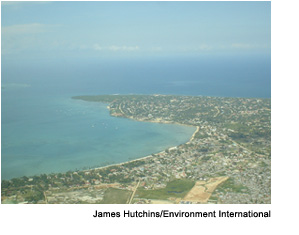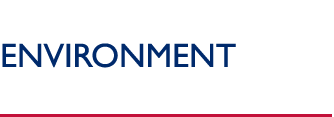Pollution and Water Resources
 |
Addressing land-based sources of pollution protects
coastal and marine environments, such as the one
seen here in Dar-es-Salaam, Tanzania. |
Healthy freshwater, coastal and marine ecosystems provide a wealth of goods and services to billions of people. Population growth and agricultural and urban development are taking place at rapid rates in many areas, resulting in competing land uses and increased pressure on aquatic, coastal and marine ecosystems. Pollution, originating from different land-based practices, has some of the most severe impacts on these ecosystems and the viability of long-term use of ecological services by people in developing areas.
USAID makes significant contributions to promoting pollution prevention. There are five broad categories in which USAID promotes pollution prevention activities, including:
Wastewater Treatment
Municipal wastewater contains a broad spectrum of contaminants from different sources, including human sewage, "gray water," pesticides, detergents, lubricating oils, and industrial wastes. The threat to marine ecosystems from this type of pollution is especially acute in the developing world where wastewater treatment infrastructure is severely lacking. Fortunately, investments in wastewater treatment can provide a high return, with benefits that have many social, economic, and environmental dimensions.
To learn more about USAID’s wastewater treatment activities, see:
As-Samra Wastewater Treatment Plant Project in Jordan
Watershed Management and Integrated Water Resources Management
USAID is investing in a wide range of activities targeting Integrated Water Resources Management (IWRM). Marine ecosystems are at risk from multiple stressors, including many that derive from poorly managed watersheds. Sediments, chemicals, and other pollutants runoff the land when watersheds have been deforested, over-built, and have lost their natural vegetative buffers along river and stream banks. The link between IWRM and the prevention of marine pollution is strong, as watershed management activities (e.g., water quality standards, soil erosion best practices) moderate pollution and promote the health of downstream habitat, including mangroves, seagrasses, and coral reefs.
To learn more about USAID’s activities in watershed management and IWRM, see:
Management of Aquatic Ecosystems through Community Husbandry (MACH) in Bangladesh
Manejo Integrado de Recursos Ambientales (MIRA) in Honduras
Coastal Resources Management
Promoting sustainable coastal and marine resources use is crucial for securing livelihoods, fisheries, and food resources, and for biodiversity conservation. Many integrated coastal management programs incorporate marine protected areas as cornerstones for local participation and improved governance. Good governance practices foster leadership, accountability, participation, equity, and transparency in information gathering and decision-making. A sound governance approach to coastal resources management ensures that a range of political, institutional, administrative, social, and economic systems is in place to develop, manage, and protect coastal resources at multiple levels, and at scales appropriate to the resources to be managed in a proactive manner.
To learn more about USAID’s activities in coastal resources management, see:
Tanzania Coastal Management Partnership (TCMP)
Clean Production and Pollution Control
USAID addresses point and non-point source pollution through the promotion of cleaner production of goods and services. Cleaner production is a business management technique that directs attention toward inefficiencies and waste that erode profits and competitiveness, reducing the environmental sustainability of business ventures as well as the economic viability of a company. Indeed, to modernize effectively and participate in an open economy, firms need to incorporate environmental considerations into daily operations and adopt measures that improve the use of water, natural resources, materials, and energy. When aggregated on a national scale, clean production adds to economic growth while decreasing effluent loads to airsheds, watersheds, and ultimately, coastal areas.
To learn more about USAID’s clean production and pollution control activities, see:
Clean Production Support in Peru
Environmental Management Systems and Pollution Prevention in Romania
Water Management for Agriculture and Aquaculture
Effective water management in agriculture and aquaculture is vital to control the impacts of pollution in coastal and marine environments. Nutrient enrichment (nitrogen and phosphorous compounds) can be a major threat to the marine environment. Sedimentation caused by soil erosion, as well as agro-chemicals (i.e., insecticides, herbicides, and fungicides) used in agriculture, also threatens coastal and marine ecosystem function. Effective use of water resources is embedded in many projects that promote sustainable food production.
For more information on USAID’s activities in water management for agriculture and aquaculture, see:
Technical Assistance for Agricultural Pollution Reduction in Romania
Additional Pollution and Water Resources
Back to Top ^
|


